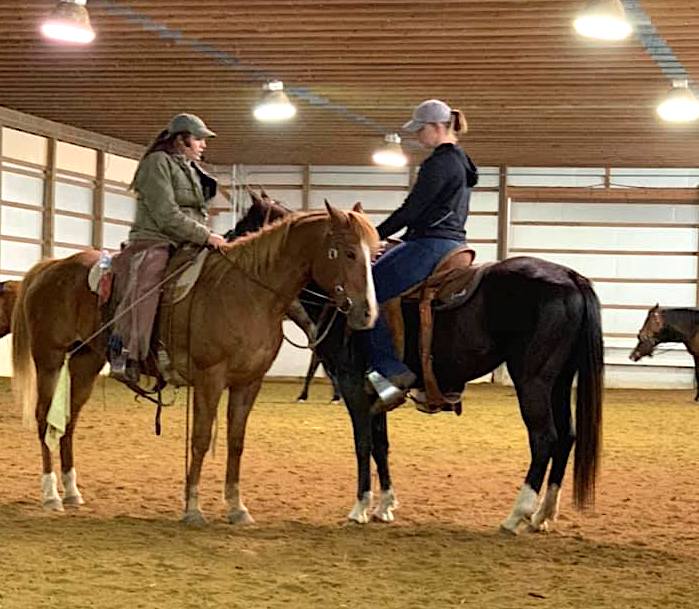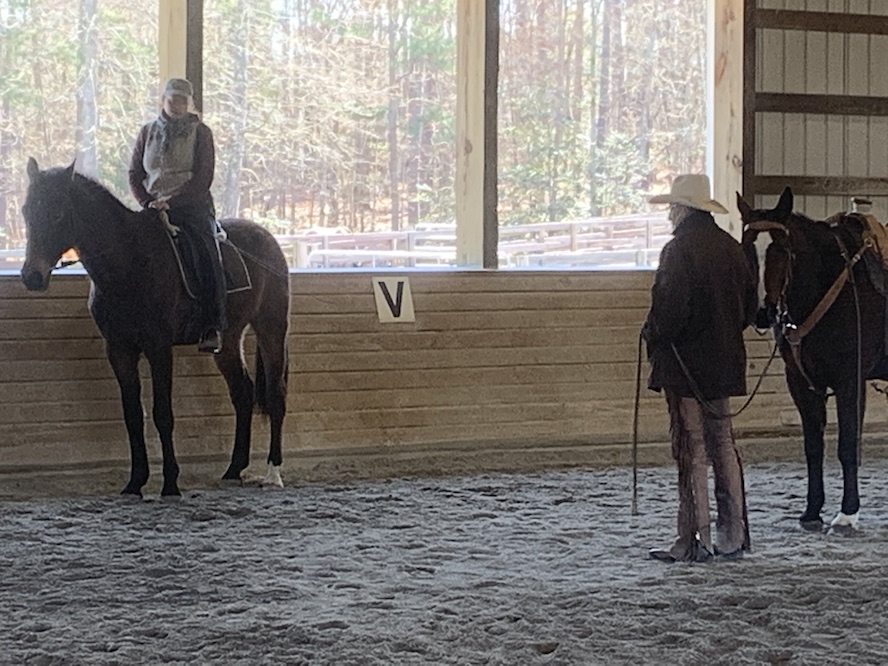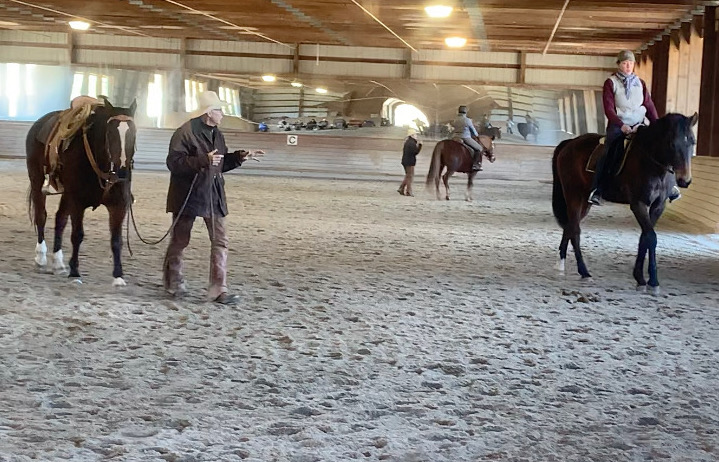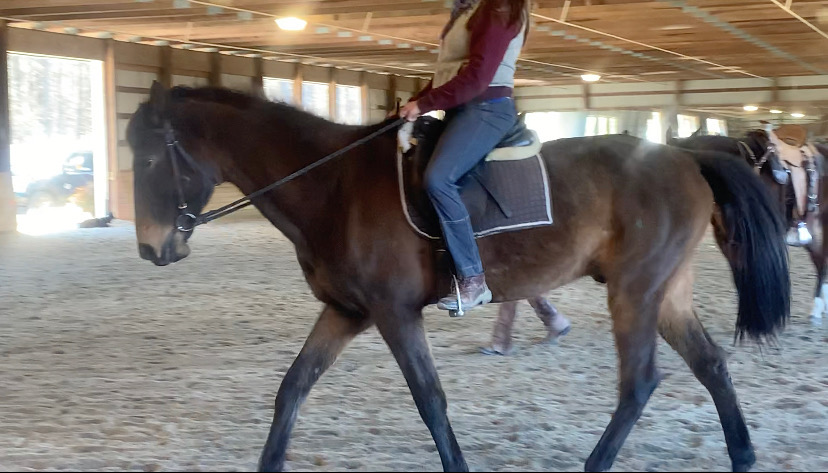
Amy Skinner works with a student
Editor’s Note: Amy Skinner is a regular guest columnist and has been a horse gal since age six. She will present with fellow trainer and rider, Katrin Silva, at the Best Horse Practices Summit.
Skinner rides and teaches dressage and Western. Skinner has studied at the Royal Andalusian School of Equestrian Art in Spain, with Buck Brannaman, Leslie Desmond, Brent Graef, and many others. Visit Amy’s website here.
Buy her book, To Catch a Horse here.
Skinner writes:
One of the things I have focused on in my work with horses is helping them answer the question: “Am I safe?” at the very beginning of each ride. West Taylor helped me understand this point, and since then, it’s been a central focus of my warmup with each ride. But two clinics recently drove home this point for me as a teacher of humans. In order to optimize our learning, we need to feel safe, too.

Amy Skinner consults with Mark Rashid
It was sunny and cold. My husband, students and friends were lined up outside the arena to watch me ride with a well-known German instructor. The horse I was riding was stiff from being stalled for a few days. As I warmed him up, I felt the issues he’d been sent to me for training return: anxiety about cantering, especifically around flying changes, and stiffness in the neck and bridle. I hadn’t asked for a change in the warmup, but the canter brought this anxiety up. So, I spent some time trying to get him relaxed in the walk and trot before the lesson.
In my lesson, an exercise went sideways quickly, literally. It involved quick transitions from a trot leg yield to a canter with a 5-meter half circle turn. My horse’s anxiety escalated and he began cantering sideways. The instructor said, “more inside leg!” I became more tense, and suddenly became very aware of the people watching the mess unfold. I worried about what they thought, what the instructor thought, and I worried I was ruining this nice horse.

Rashid and Skinner continue to converse
By the end of the lesson, I hadn’t gotten the situation straightened out, and I felt totally defeated. My friends and students had watched me fail. I’d failed the horse. And I was questioning whether I should even teach anymore. My next lesson went a little better but my heart had sunk and my desire to try was depleted.
The following week, I was scheduled to ride with Mark Rashid. The anxiety crept back up. What would my students think of my ability? I brought my own horse this time. Would his issues make me look bad? What would Mark think of me? I did my best to take some deep breaths and quiet my mind before riding, but the anxiety sat with me as I began my lesson.
My horse was stiff, anxious, and calling for his friend (who I’d brought along in hopes of calming him). Mark watched me warm him up and asked me questions. My shoulders were tight. I tried to stay with my horse, forget about the students of mine watching, the local trainer in the doorway, and just focus on my horse.
I was sure Mark could see and feel the mess I had going on in my head, because he took some time to talk with me, throw in some compliments about my riding, and explain things in a positive way. His presence was peaceful and non-judgmental. I didn’t feel like he treated me any differently than anyone else. He was here to help whoever wanted to be helped.
I started to relax some and I was able to ride my horse. He gave input and direction in a way that helped me make changes with my horse. My confidence started to come back. Within a few moments, I was back to myself again, just riding my horse with some good help.

Bellus learns to let go of his brace
My gelding started breathing, let go of his back and loosened up. The little things were working better, and I felt I had achieved something.
I drove home that night thinking about how much a teacher can affect the confidence of their students. For us teachers, it isn’t enough to just know a lot. A good teacher teaches to the students’ needs. They make it possible for students to succeed, even if only in baby steps. They break things down and find ways to explain the building blocks of any given exercise. When things don’t work out, they break it down even more, or move on to something else.
The lessons I had were an incredible reminder in how important it is as a teacher to help students feel safe, physically and emotionally. To feel safe to try, comfortable enough to learn. Just as a horse isn’t able to learn when anxious or uncomfortable, a student’s mind is not open when they feel defensive, scared, or anxious. A good teacher can help bring peace to the rider, so they can offer it to the horse.
The late American spiritual teacher, Ram Dass, said, “everyone is the guru if you know how to listen.” The first lesson was a great experience in empathy for my students who experience this worry in lessons. The second was a wonderful lesson in how much learning can take place when the mind is quiet. So, as I go about my teaching now, I will work harder to protect and develop the confidence of my students, and to help them answer the question, “am I safe?”
Very important things to think about. How amazing you are humble enough to use these situations to better realize how your students might feel and how you can better reach them.
I love every word of this. I have been there so many times. Like you’ve said, horses can’t learn if they are afraid/anxious/distracted. Nor can we. And if one of us in the partnership isn’t calm and focused, it is hard for the other one to be calm and focused. The instructor can be crucial in interrupting this cycle or contributing to it. Thank you for being so transparent, Amy.
Thank-you for this sharing your experiences in this insightful and thoughtful article.
I literally just wrote a “blog” on this a month or so back! It’s incredible Amy how many amazing teachers there are out there that sometimes we just can’t connect with. I have had several experiences that have either made myself or my horse feel so anxious and defeated. It’s hard because as professionals we want to listen and to learn but sometimes we also for our own sanity and the wellbeing of our horses have to know when things “just aren’t working” and I think as professionals need to be able to say thank you maybe another time. For me it took me months to come out of my funk and with a different instructor my horse can her that woman’s voice to this day (even at a show) and she gets rigid and stiff and becomes a dragon! It’s incredible how much our energy as instructors influence our students and their horses! Something we must also be aware of!!!! And we must be adaptable and recognize when our idea isn’t working and be willing to try a different path to help our students and their horses! Thank goodness the world has compassionate people in the world with minds like yours Amy!